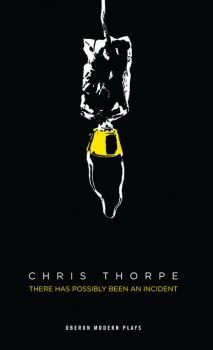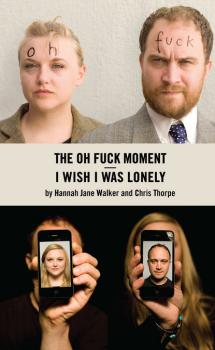ТОП просматриваемых книг сайта:
Зарубежная драматургия
Различные книги в жанре Зарубежная драматургия, доступные для чтения и скачиванияАннотация
Commemorating the centenary year of the death of suffragette martyr Emily Wilding Davison, the first full professional production in more than thirty-five years of Pam Gems' feminist classic Dusa, Fish, Stas and Vi.Four determinedly 'liberated' – and very different – women ricochet around a tiny shared flat, while trying to pull together the shattered strands of their lives: Dusa is struggling to regain her children from their father, Fish is losing her lover to another woman, Stas is on the game to finance the course she wants to study at university, while Vi steadfastly refuses to eat....A bitingly sardonic modern classic, widely regarded as an historic icon of early feminism, Dusa, Fish, Stas and Vi was first seen at the Edinburgh Festival Fringe in 1976 under the title Dead Fish, Michael Codron transferred the play to the West End under its new title where it enjoyed a huge success and established Pam Gems as a major new voice in British theatre
Аннотация
When life offers you a choice between heroism and compromise – what happens? Sometimes planes don’t land the way they’re supposed to. The people of a country have had enough of their leaders, but those leaders have to be replaced with something. A person steps out of a crowd and, for a moment, becomes more than human. A man walks into the lobby of a building and brings death with him to prove his point.There Has Possibly Been An Incident is the new play from award winning British playwright & performer, Chris Thorpe.
Аннотация
Sex and violence in Stockholm, Tel Aviv and Paris. Political murder in suburban London. Death, love and homicide in New York. War in the belly of a whale. These are the themes in Julia Pascal’s latest collection which takes place in Europe in 1982, in London in 1946 and in a whale at any time. HONEYPOT: Ten years after the massacres at the Munich Olympics, Susanne joins Mossad as a secret agent. This beautiful Swedish woman is at the heart of a struggle between desire and destruction, between love and infidelity, between motherhood and freedom. Between Arab and Jew.BROKEN ENGLISH: An exploration of a secret history that happened in London just after the end of the war. Why was there a plot to assassinate Ernest Bevin, the Foreign Secretary by right-wing Jewish activists? When does loyalty to nation state conflict with loyalty to nation? NINEVEH: What happens when four former soldiers are trapped in a whale? How can they live with the atrocities they have committed and escape from this hell which imprisons them? Based on research in Kashmir, Israel, Rwanda and Lebanon, this Beckettian play fuses absurd humour, the horror of war and the possibility of redemption in a ninety-minute drama.WOMAN ON THE BRIDGE: Judith, a London journalist, goes to the Brooklyn Bridge. Does she want to jump off? On her disturbing journey she spends a night with a very young man, she meets Anna, her hundred-and-ten-yearold great aunt and Gloria, a homicide cop. Her encounters with these New Yorkers forces her to change her life.
Аннотация
In 1994 the Criminal Justice Act effectively outlawed raves, banning public gatherings around amplified music characterised by ‘the emission of a succession of repetitive beats.’Featuring a soundtrack from a live DJ and psychedelic 90s-inspired visuals, Beats tells the story of Johnno McCreadie, a teenager living in a small suburban Scottish town at the time of the Act. Beats is an award-winning new play by Kieran Hurley; a coming-of-age story exploring rebellion, apathy, and the irresistible power of gathered youth.Beats was the winner of CATS Best New Play Award 2012
Аннотация
‘David Johnston has a feel for Spanish and English like that of a lover; he’s a poet and a man of the theatre, but most importantly he’s also a contemporary of Lope, Tirso and Calderón. There’s no other way of explaining the vivid translations he has written.’ Juan Mayorga What this book most definitely is not is yet another academic discussion of Lope de Vega, Calderón and their contemporaries, divorced from any understanding of what makes these plays work so brilliantly on our stages. Instead it is a leading contemporary translator’s account of why these plays deserve to assume their rightful place in our performance repertoire, firmly set within the demands and opportunities of how our theatre works. In a way it is the story of a love affair between a translator and a dramatic tradition whose riches are only now becoming apparent to theatre audiences; but it is also an exploration of the ways in which translation itself takes plays that are distant from us in time and space and makes them real and visible in terms of our own experience and our contemporary sensibilities.
Аннотация
In the wake of Ireland’s recent economic rise, fall, and associated social crises, theatre and performance have played vital roles in reflecting on the past, engaging the present, and imagining possible futures.That Was Us features a wide, rich range of critical essays and artist reflections that strive to make sense of some of the most significant shifts and trends in contemporary Irish theatre and performance. Focusing on artists connected to the Dublin Theatre Festival, the book addresses work by the Abbey Theatre, ANU Productions, Brokentalkers, The Corn Exchange, Druid, Fabulous Beast Dance Theatre, the Gate Theatre, Landmark Productions, Rough Magic Theatre Company, THEATREclub, Theatre Lovett, Pan Pan, The Stomach Box and THISISPOPBABY, among others. Some of the burgeoning forms and practices discussed include: site-specific and site-responsive theatre; testimonial, documentary, and biographical performance; dance theatre; theatre for children and families; new writing; and fresh takes on canonical writing staged at home or toured internationally.In bringing together critics and artists to think side by side, That Was Us is indispensable for anyone interested in contemporary practices and cultural politics. Contents1. The Power of the Powerless: Theatre in Turbulent Times by Fintan WalshONE: Theatres of Testimony2. ANU Productions and Site-Specific Performance: The Politics of Space and Place by Brian Singleton3. Witnessing the (Broken) Nation: Theatre of the Real and Social Fragmentation in Brokentalkers’ Silver Stars, The Blue Boy, and Have I No Mouth by Charlotte McIvor4. You Had to be There by Louise LoweTWO: Auto/Biographical Performance5. Making Space: Female-Authored Queer Performance in Irish Theatre by Oonagh Murphy6. The Writing Life by Helen Meany7. Metaphysicians of Unnatural Chaos: Memories of Genesi by Socìetas Raffaello Sanzio by Dylan TigheTHREE: Bodies Out of Bounds8. Insider and Outsider: Michael Keegan-Dolan in the Irish Dance Landscape by Michael Seaver9. And the Adults Came Too! Dublin Theatre Festival and the Development of Irish Children’s Theatre by Eimear Beardmore10. Living Inspiration by John ScottFOUR: Placing Performance11. Representations of Working-Class Dublin at the Dublin Theatre Festival by James Hickson12. ‘Getting Known’: Beckett, Ireland, and the Creative Industries by Trish McTighe13. The Art of Perspective by Michael WestFIVE: Touring Performances14. Druid Cycles: The Rewards of Marathon Productions by Tanya Dean15. Staging the National in an International Context: Druid at the Dublin Theatre Festival by Sara Keating16. Viewed from Afar: Contemporary Irish Theatre on the World’s Stages by Peter Crawley17. A Dance You Associate With Your Family by Gary Keegan.
Аннотация
Old Earth has nothing left for us, and so it is time for a new beginning. Cross galaxies, traverse light years and find yourself in a world where you can be the centre of your own universe. Welcome to New Earth. Never look back. Vela, the revered and celebrated architect of this new society, has recently been avoiding her public duties in favour of visiting the Old Earth Museum and the company of its Security Guard. As the final migrants arrive, she is becoming increasingly obsessed by her memories, and questions are growing about her sanity.Leaving Planet Earth is a site-responsive promenade production on anepic scale. Tracing the story of humanity’s first migration into space, it asks fundamental questions about our connection to this planet. Should we leave this world, and if so, who will endure and at what cost?
Аннотация
[i]'Better to bear each day, to laugh and cry and sing and go my way freely, to think nothing of my name, to journey only, though the journey be O halfway to the moon![/i] Swordsman, Philosopher, Poet, Raconteur – Cyrano de Bergerac is all these things, but none of them makes him happy. What he desires above all is the love of the beautiful Roxane. But his problem is as plain as the nose on his face. Surely he is too ugly ever to be loved? Salvation of a kind arrives in the form of the handsome yet tongue-tied Christian de Neuvillette – might not Cyrano’s eloquence and Christian’s beauty together win Roxane? Yet duelling foes, powerful rivals, and a war against Spain will all put our hero to the test before he finds his way at last into his lady’s arms.
Аннотация
Two performance texts by Hannah Jane Walker and Chris ThorpeThe Oh Fuck MomentFucking up is the truest, funniest, most terrifying moment you can experience. Poet Hannah Jane Walker and theatre-maker Chris Thorpe examine the poetic guts of mistakes in a bundle of words and strip lighting. The Oh Fuck Moment is an award-winning conversation around a desk for brave souls to hold their hands up and admit they fucked up, or for people to laugh at us because we did. ‘A brilliant celebration of our mistakes and evolutionary reflexes’ Guardian I Wish I Was LonelyI Wish I Was Lonely is an interactive show about contactability asking whether the invisible waves we’re tethered to might be drowning who we are. It’s a show in which the audience commit to leaving their phones on. A show investigating what it means to participate in communication – or not. There are poems, there are stories and there is conversation. I Wish I Was Lonely sees Hannah Jane Walker and Chris Thorpe ask how much of ourselves we’ve given up to the new gods in our pockets.
Аннотация
‘I can see this life for exactly what it is. I can now, anyway. We’re walkin’ a knife edge. One slip, one tiny slip an’ we fall. An’ there’s a fuck of a long way to fall…even for us. An’ we’re kept there…on the knife edge…because they can tell yer which way t’go. Forward or down.’Fin’s bright. Some would say gifted. But school isn’t going well. While he is busy coping with his mum’s depression and his younger brother’s drug problem, he can feel his future slipping away. The few jobs that are available in North London are part-time or temporary, and Fin knows his future will be a life of unstable pay, minimal social security benefits, no pension and eroding health care. He is the uture of the emerging major class – living precarious lives at the mercy of the one percent: The Precariat. With his world collapsing slowly around him, Fin finds hope and attraction with the girl at the fried chicken drive-through window. But even she can’t offer him a way out. Fin makes one final desperate bid to take control over the future – by giving his brother the chance to turn his life around…










